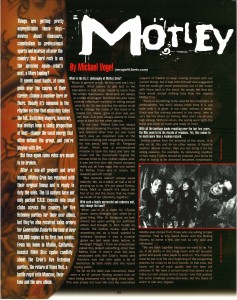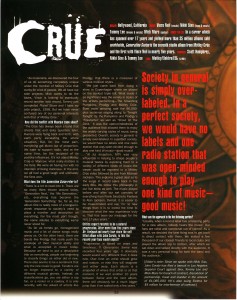
(click on picture to open file)
By: Michael D. Vogel
© July 1, 1997. Michael D. Vogel. All Rights Reserved.
Published in:
The Album Network magazine – July 18, 1997
Things are getting pretty unpredictable these days–movies about dinosaurs, cannibalism in professional sports and hearsay all over the country that hard rock is on the upswing again–what’s next, a Mars landing?
It seems most bands, at some point over the course of their career, change a member here or there. Usually it’s someone in the rhythm section that ultimately takes the fall. Switching singers however, has always been a shaky proposition at best. Change the vocal energy that often defines the group and you’re playing with fire. But then again some rules are meant to be broken.
After a brief hiatus and a one-off project, Mötley Crüe have returned with their original lineup and are ready to defy the odds. The LA natives have not only packed S.R.O. crowds into small clubs across the country for live listening parties of their new album, but are also receiving weekly sales orders for Generation Swine to the tune of over 120,000 copies in the first two weeks. From his home in Malibu, California, bassist Nikki Sixx spoke candidly about their live listening parties, the return of Vince Neil, a battle royal with Mancow, their fans and the new album.
What is the D.i.Y. philosophy of Mötley Crüe?
Nikki Sixx: “Music in general is still, for the most part, very corporate. What seems to get lost in the translation is that music needs to come from the artists themselves. Musicians are always in a state of struggle. But, there are also many outside influences insisting on telling people what to do. On any one-day the advice could be to change the name of the band or maybe cut, shave, grow or even dye your hair blue. Everyone always seems to know what is best for the other person and never for themselves.
“In our case, Mötley Crüe has always been about breaking the rules. Influences and opinions other than our own really don’t play an important role in the decision-making and songwriting process for the band. With the Dr. Feelgood album, there was a preconceived mission to buck the band and take the music into the mainstream beyond the normal three to four million copies sold. It was the first time the record company really put all their eggs into one basket for Mötley Crüe–and in return, the rewards paid off nicely!
“But success doesn’t always equal maturity. We, as a band, all had a lot of growing up to do. It’s not about Tommy, Vince, Mick or myself–it’s about the four of us and the music that we make as result of our chemistry together.”
With such a highly successful and cohesive unit, why change the band?
NS: “When you’re in a band for 15-plus years, some changes can often be a good thing. After Dr. Feelgood we took almost two years writing our self-titled album and brought in John Corabi on vocals. His mellow, bluesy style was something we, as a band, wanted to embrace because it was a musical genre we had never done before. In hindsight though, I think we should have called this project something other then Mötley Crüe. It wasn’t what the fans associated with the Crüe ‘s music and therefore was met with quite a bit of resistance by both radio and the record buying public.
“As far as the label was concerned, there were a lot of rumors floating around that we were being pressured into bringing Vince back. This was simply not true! We had the committed support of Elektra to keep moving forward with our current lineup, but it was John himself who suggested that we could get more productivity out of the music with Vince back in the band. He simply felt that the fans would accept nothing less the original Mötley Crüe.
“There is something to be said for the chemistry of personalities. You don’t always know what it is you have until it is gone. In our case, without a doubt, Vince was the missing element in the band. John is very low key, where as Tommy, Mick and I are all very high strung. With his return, the spring went tight; the band was back on track and ready to rock!
With all the heritage bands reuniting over the last few years, the 90s seem to be the decade of reunions. Yet, this seems to be much more then a reunion record.
“Validity comes from the sincerity of the music. It is why we do this and for no other reason. If there is another ulterior motive, then you are doing it for the wrong reasons. For example, by calculating royalties or how many T-shirts should be ordered, your focus for what is trying to be achieved becomes misdirected. Validity also comes from those that are willing to take chances. That is why David Bowie and the Rolling Stones, to name a few, are still so very cool and influential.
“We are back together because we want to be. For us, it all starts in the living room with an acoustic guitar and some toilet paper to write on. The intention must be put in at the very beginning of the songwriting process for music to be truly honest. At that time, the music will be of such quality that the fans will embrace it. We have a certain bond that allows us to make our own unique kind of music–one that pushes the sonic envelope production-wise but the basis of which is still very organic.
“As musicians, we discovered the four of us do something completely unique under the moniker of Mötley Crüe that works for a lot of people. We all have our side projects: Mick wants to do the blues, Vince is looking to eventually record another solo record, Tommy just completed Planet Boom and I have my side project, 1958. But we have never confused any of our personal interests with that of Mötley Crüe.”
How did the conflict with Mancow come about?
“The Crüe has always been a band that shoots first and asks question later. Rumors were flying back and forth, with each party escalating the whole situation. But, for the most part, everything got blown out of proportion. We want to support radio and at the same time be the recipient of its positive influences. It’s not about Mötley Crüe or Mancow, what really matters is the fans. We were all having fun with no intention of being malicious. In the end, we all had a good laugh and ultimately the fans won.
What does the title Generation Swine refer to?
“There is a lot to read into that. There are so many titles thrown around today, Generation Next, the Me Generation, etc., everything has become the ‘Generation Something.’ So, for us, the album title is really more of a tongue-in-cheek response to society’s need to place a moniker and description on everything. For the most part though, the name alludes to everything we’ve never stood for.
“As far as trends go, homogenized music and a lot of dance songs really annoy us. On the other hand, there are bands like Prodigy that really push the envelope of their musical ability and what is accepted in music today. Because we tend to put a descriptive title on everything, people are beginning to classify things as either old or new. There also seems to be a sentiment that only the new music is good. Fanatics are no longer exposed to a variety of different musical genres. Instead, as classifications go, you are either a rap fan, or a rocker or a cowboy. It is only recently, with the advent of artists like Prodigy, that there is a crossover of various musical styles.
“We just came back from doing a show in Copenhagen where we played on the coolest triple bill. What made it so significant was the variety in styles of the artists performing–The Smashing Pumpkins, Prodigy and Mötley Crüe. Even more amazing was the 90,000-plus audience singing along to ‘Tonight Tonight’ by the (Smashing) Pumpkins and Prodigy’s ‘Firestarter’ as well as ‘Shout At The Devil.’ It was the open-mindedness of the audience that allowed them to enjoy the widely varying styles of music being presented. Overall, society in general is simply over-labeled. In a perfect society, we would have no labels and one radio station that was open-minded enough to play one kind of music–good music!
“At its inception, MTV was very influential in helping to shape peoples musical tastes by exposing them to a variety of different kinds of music. At one moment, the viewer would be exposed to a Mötley Crüe video followed by one from Michael Jackson. This explains a great deal as to the surge in record sales back in the early 80s. We follow this philosophy in our live show as well. The music played before and after our set consists of everything from Frank Sinatra to Pantera to Alan Jackson. Overall, it is easier to be close-minded and say ‘no’ to new things than it is to invest the time to discover what the new experience truly is. That has been our message for the last 17-plus years.”
Critics expect records to be a natural progression. After more than years since Dr. Feelgood and nearly four since the self-titled album, is this the record your fans would expect?
“Progression is based on years and timelines. If Generation Swine were recorded four years ago, it obviously would sound very different than it does now. Over time an artist should grow and mature, or else they will stagnate and whither away. Each album is a snapshot of where that artist is at that moment. If we wait another 10 years between Swine and the next album, there will obviously be a much bigger jump than if we waited only a few years.”
What was the approach to the live listening parties?
“Usually, when a record label has a listening party for a new album, nobody hears the music. Our fans are rabid and somewhat out of control. As a result, we decided the best thing was to get back in direct contact with them. We invited a few thousand of our closest friends to local clubs and played the album top to bottom. After which, we sat down and talked directly with the audience. It was a very personal thing for both the band and the audience. In some cities, the results were phenomenal where as others were complete chaos.” ^m^
Photograph credit: John Harrell
Origin:
Hollywood, California
Line-Up:
Vince Neil – Vocals Nikki Sixx – Bass & Vocals
Mick Mars – Guitar Tommy Lee – Drums & Vocals
About The Current CD:
In a career which has spanned over 17 years and yielded more than 35 million albums sold worldwide, Generation Swine is the seventh studio album from the Mötley Crüe and the first with reunited singer Vince Neil in nearly five years.
Discography:
Generation Swine (Mötley/Elektra/EEG, 1997) Theater Of Pain (Elektra 1985)
Mötley Crüe (Mötley/Elektra/EEG, 1994) Shout At The Devil (Elektra 1983)
Dr. Feelgood (Mötley/Elektra/EEG, 1989) Too Fast For Love (Elektra 1981)
Girls, Girls, Girls (Elektra 1987)
Produced By:
Scott Humphrey, Nikki Sixx & Tommy Lee
Label:
Mötley/Elektra/EEG
Website:
© July 1, 1997. Michael D. Vogel. All Rights Reserved. This originally appeared on the Vogelism blog at https://www.vogelism.com authored by Michael D. Vogel. This article may be shared or reprinted as long as the entire copyright message, including the source location of this article, accompanies it.














 Welcome to Michael D. Vogel’s online portfolio. I am a Los Angeles-based music journalist/content creator, and self-professed music-fanatic/radio-aholic. With more than 20 years of experience in multiple facets of the music industry including; music programming/air talent for terrestrial and internet radio as well as record label artist promotion, I have a finger on the pulse of what's new and under the radar in the emerging music scene. Areas of specific expertise include, but not limited to: rock (heritage, mainstream, heavy metal/hard rock and alternative), pop and adult contemporary, as well as radio, pop culture, sports, exercise and politics. I am applying my passion for music as a freelance writer for the Examiner as National Music Examiner (Examiner.com) in addition to West Coast Editor for FreeGotham (FreeGotham.com). Find me at michael@vogelism.com.
Welcome to Michael D. Vogel’s online portfolio. I am a Los Angeles-based music journalist/content creator, and self-professed music-fanatic/radio-aholic. With more than 20 years of experience in multiple facets of the music industry including; music programming/air talent for terrestrial and internet radio as well as record label artist promotion, I have a finger on the pulse of what's new and under the radar in the emerging music scene. Areas of specific expertise include, but not limited to: rock (heritage, mainstream, heavy metal/hard rock and alternative), pop and adult contemporary, as well as radio, pop culture, sports, exercise and politics. I am applying my passion for music as a freelance writer for the Examiner as National Music Examiner (Examiner.com) in addition to West Coast Editor for FreeGotham (FreeGotham.com). Find me at michael@vogelism.com. 